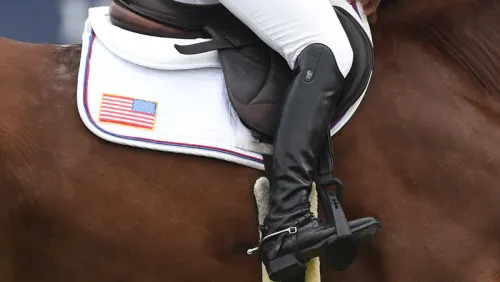The number of horses sickened in an EHV-1 outbreak at Desert International Horse Park has risen to 19, according to a Thursday update from the California Department of Food and Agriculture, with test results pending for five more horses that have spiked fevers.
The number of confirmed cases includes three horses that had traveled back from the showgrounds in Thermal, California, to their home barns. Those horses, which have fevers but are not showing neurological symptoms, have been isolated and will be quarantined, along with any other exposed horses, at their home barns in Santa Barbara, Ventura and San Mateo counties, the update said.
An additional three horses stabled at DIHP were confirmed positive with EHV-1, displaying fever but no neurologic signs. All three were from outside the index barn where EHV-1 first was reported on Feb. 11.
The current number of confirmed cases is three horses with equine herpesvirus myeloencephalopathy (EHV-1 with neurological symptoms) and 16 with fever-only EHV-1.
LAEC Horse Tests Negative
Elsewhere in California, organizers of the LA February Show, held Feb. 18-20 at the LA Equestrian Center, announced that they recently learned of a fourth horse that came to the show from Thermal without completing the full recommended seven-day isolation.
One horse that attended that show reported a fever afterward but tested negative for EHV-1 and is recovering, organizers said in an email. A second horse that had been at the show developed severe neurological symptoms and had to be euthanized Tuesday, organizers reported. However, EHV-1 test results from that horse have not come back, and a representative of CDFA emphasized that no definitive diagnosis has been made in that case yet. That horse’s test results are expected today, Thursday.
ADVERTISEMENT
Neither horse had been at DIHP previously, officials said.
FEI Blocks Desert Circuit Horses
In response to the California outbreak, both Palm Beach International Equestrian Center and the Fédération Equestre Internationale have moved to block horses that recently competed in the state from entering upcoming shows.
This week, the FEI announced it will not allow horses who have recently competed at DIHP to participate in FEI events elsewhere.
“The FEI is working closely with the Desert Circuit management team, the CDFA and [U.S. Equestrian Federation], to ensure all biosecurity protocols with isolation and quarantine related measures are in place, while affected horses remain under veterinary care and direct supervision,” an FEI spokesperson said.
“Among the mitigation measures, the FEI has recently blocked a number of in-contact horses to prevent the virus being transmitted at future events. All the Persons Responsible (PRs) whose horses have been on the venue and their administering [national federations] have been contacted with the necessary information and the biosecurity measures that need to be implemented in order to be unblocked and eligible to compete at FEI Events again.”
PBIEC Changes Admission Rules
ADVERTISEMENT
Equestrian Sport Productions, which runs shows at PBIEC in Wellington, Florida, revised entrance policies twice in the past week.
On Feb. 21, officials issued a notice saying anyone shipping horses into the Florida venue would have to sign a declaration affirming “the horses entering the facility are healthy and have not competed in California or been in close contact with horses that competed in California within 14 days prior to their arrival.”
Two days later, “[a]fter reading the advice of the FEI Veterinary Department,” they updated the policy to give competitors more options for admission. Effective immediately, people shipping in have to sign a declaration that the horses have not been in a California competition since Jan. 28, or 28 days previous to arrival. Alternately, under the new guidance, horses that have competed in California since Jan. 28 can be admitted to the Florida show grounds in one of two situations: if they have either two negative PCR nasal swabs, taken at 7 and 14 days after leaving a California competition, or if they have isolated for 21 days after leaving the California venue and have a negative nasal swab taken after that 21st day.
“As with any situation that involves our horses’ welfare, we are all relying on the honesty of the individuals that are responsible for the horses’ care,” the statement from ESP said. “Due to the severity of the EHV-1 cases that are currently in California, the documents that will be required to bring a horse onto the PBIEC show grounds will be considered truthful and binding. In the event of any of these protocols being disregarded, we will refuse further entries from all related horses and we will inform USEF for further disciplinary action.”
USEF Cautions Against Non-Compliance
In a statement Thursday morning, USEF reiterated the need to strictly adhere to biosecurity requirements and best practices and said that those not complying with these measures at USEF shows could face disciplinary measures.
“USEF has received reports of non-compliance with ordered quarantine and entry requirements at competitions,” the statement said. “These reports are under investigation. Substantiated violations will result in penalties.”














